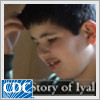
Listen to/view CDC podcasts on your computer or download them for reliable health
and safety information when and where you want it. New to podcasting? See
Podcast Help and RSS Help
The Story of Iyal

In this podcast, a mother tells her compelling story about a family living with fetal alcohol spectrum disorders. Created: 8/24/2009 by National Center on Birth Defects and Developmental Disabilities (NCBDDD). Date Released: 8/24/2009. Series Name: CDC Featured Podcasts.
Press Play to listen to this CDC Podcast
Running time = 3:27
To save the Podcast, right click the "Save this file" link below and select the
"Save Target As..." option.
How are we
doing?
Podcasting Resources
Contact Us:
- Centers for Disease Control and Prevention
1600 Clifton Rd
Atlanta, GA 30333 - 800-CDC-INFO
(800-232-4636)
TTY: (888) 232-6348 - Contact CDC–INFO

